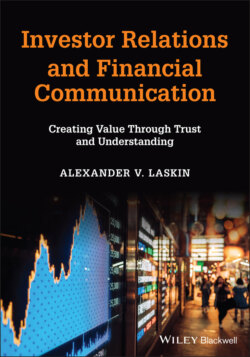Читать книгу Investor Relations and Financial Communication - Alexander V. Laskin - Страница 16
Education and Training
ОглавлениеMost people working in investor relations do not have an educational background in investor relations. It is not surprising considering there are pretty much no majors in investor relations. At best, one can find a standalone course in investor relations, financial communication, or business journalism. Only a small number of educational institutions have minors or specializations. For example, Newhouse School at Syracuse University launched a financial and investor communications emphasis that prepares students for jobs in investor relations, financial services, and corporate communications. As a result, just taking a class or two in investor relations or financial communication already puts a student ahead of many other job seekers. Some students interested in investor relations build their own program of study combining courses from accounting, finance, law, and strategic communications. Such students may major in communications to hone their writing and public speaking skills, while minoring in accounting to develop a good understanding of financial statements.
A study of IROs who are members of NIRI found that most IROs today have a business background. More than two-thirds of IROs in the survey reported having their bachelor’s degree from one of the business school majors – finance, accounting, or management. IROs with communication education were in a minority. Some IROs also reported having no business and no communication education – instead they grew into their investor relations job from an operational background and, as a result, they reported education in medicine, chemistry, aeronautics, engineering, and so on. Since the investor relations job requires an IRO to be an expert in what the company does, it is not much of a surprise that a specialist in the company’s business could become an IRO. Who better to explain the complexities and potential of a new chemical compound for future production of medicine than a chemist or a medic?
At the same time, investor relations is its own profession that has unique and challenging demands. As a result, many professionals once they become IROs seek additional training to professionalize themselves in this occupation. In fact, the same survey of IROs, reported that almost 70% of all IROs had a second, graduate, degree. It is a good idea to supplement the skills and knowledge learned during undergraduate studies and acquired throughout professional experience with a graduate degree. It gives the chance for a person with degree in communication to learn about finance and accounting, and it gives the chance to a person with a business degree to learn about communication strategies and tactics.
The variety of educational backgrounds and professional experiences in investor relations also makes the role of professional organizations in the field exceptionally important. For many IROs, a professional organization is the only place where they can actually learn about the profession itself. NIRI, the leading professional organization in investor relations, takes this responsibility seriously. NIRI organizes a lot of training sessions, seminars, and webinars. One of the most popular among these educational opportunities is Fundamentals of Investor Relations, a must-attend event for people new to investor relations. No matter what previous education or occupation a person has had, this seminar brings everyone up to speed on the practice of investor relations, covering key components of investor relations – finance, communication, marketing, and law. NIRI also maintains an investor relations accreditation, the Investor Relations Charter (IRC). IRC is important recognition in the investor relations profession and has a requirement for continuing professional education to maintain the credential.
